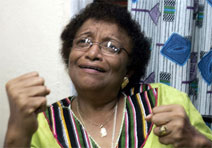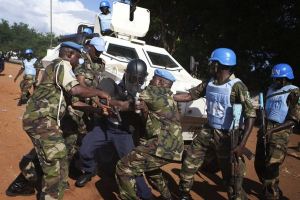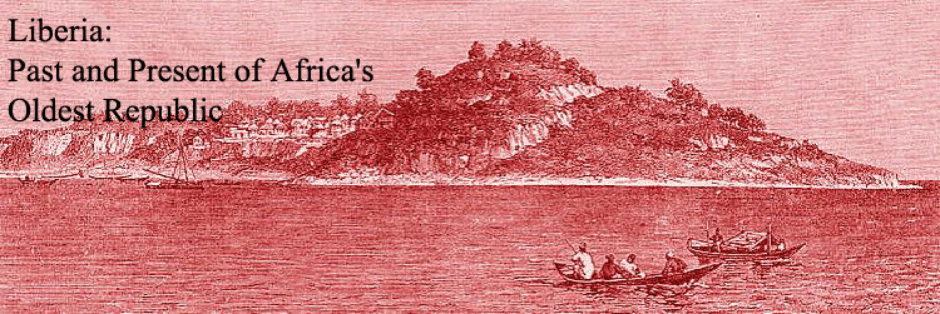Last month, in October, President Ellen Johnson Sirleaf had every reason to be happy and optimistic about the future. On October 7, she was awarded the prestigious 2011 Nobel Peace prize, together with Leymah Bowee and Tawakul Karman. On October 11, presidential elections were held and she came out Number One. And on October 29 the ‘Iron Lady’ celebrated her 73rd birthday, in good health. 
Growing political support for Ellen Johnson Sirleaf
The first round of the presidential elections was won by the Unity Party (UP) candidate, incumbent president Ellen Johnson Sirleaf, with 44% of the votes. Not enough for an outright victory since that would have necessitated more than 50% of the votes. Second came the presidential candidate of the Congress for Democratic Change (CDC) , Winston Tubman, with 33% of the votes. Number three was National Union for Democratic Progress (NUDP) leader Prince Johnson (12%) and number four Liberty Party (LP) Standard Bearer Charles Brumskine who seized 6% of the votes.
In the run-off elections of November 8, President Sirleaf faced Winston Tubman, the number 2 of the first round. Since Liberian politics is a near-family affair, they know each other well. In her autobiography ‘This Child Will Be Great’ Ellen Johnson Sirleaf describes how Winston Tubman and she attended the same meetings of the Progressive Alliance of Liberia (PAL), a grouping of progressive Liberians in the United States of America, way back in the 1970s. Furthermore, both are Harvard educated and have worked in international organizations, the UN and the World Bank. Moreover, both are septuagenarians with firm roots in Liberia’s political establishment, traditionally dominated by the Americo-Liberian elite. So what exactly was the difference between the two candidates and their political programs?
Frankly speaking, I don’t know. The campaign for the Executive Mansion was more about characters than contents.
Both Sirleaf and Tubman were seconded by ‘silent partners’: Sirleaf by Vice President Joseph Boakai – relatively little is known about this man from Lofa County who from 1983-1985 served as Minister of Agriculture under President Samuel Doe. Tubman’s running mate was football legend George Weah, who had been defeated in the 2005 run-off elections by Sirleaf. It is interesting to note that Winston Tubman also served under Samuel Doe, as Minister of Justice from 1982-1983. In 2005 he unsuccessfully ran for president for the National Democratic Party of Liberia (NDPL), the political party of the murdered president Samuel Doe. For the 2011 elections he joined the Congress of Democratic Change (CDC), Weah’s political party.
Already one week after the first round, Prince Y. Johnson, Senator for Nimba County, former warlord, ally of Charles Taylor before forming his own warring faction, and responsible for the murder of dictator Samuel Doe in 1990, announced his support for President Sirleaf in the second round. His motivation? ‘She is the lesser of two evils’, he said. However, there were rumors that a financial sum was involved. Three days later presidential candidate Winston Tubman was suddenly flown to Ghana, for medical treatment. It was unclear whether it was exhaustion or a severe malaria crisis. Ellen Johnson Sirleaf’s chances to win a second term were increasingly good.
October saw more political support for President Sirleaf. Presidential candidate Charles Brumskine, also a close ally of Charles Taylor before he broke with him, declared his support for Sirleaf during the second round of voting although the two had over the years seriously clashed. ‘Ellen is better than Tubman’ said Brumskine. Monrovians allege that he was offered the ECOWAS Vice Presidency which Liberia had assumed the previous day. There is no proof to support this, only future developments may tell.
Another presidential candidate Togba-Nah Tipoteh, a political old-timer and uncle of George Weah, endorsed the Unity Party presidential candidate, Ellen Johnson Sirleaf. Tipoteh, also a septuagenarian, served under Samuel Doe, as Minister of Planning and Economic Affairs from 1980 till 1981, when he fled to the Netherlands, fearing for his life. He is considered one of the most independent politicians. More support for the incumbent President came from Moses Blah, from Nimba County, and another former ally of warlord-President Charles Taylor. Vice President Moses Blah briefly took over the presidency after Taylor’s forced resignation in 2003.
Tubman, Weah, CDC increasingly dissatisfied and isolated
Thousands of international and national observers monitored the October 11 elections and found them free and fair. Notwithstanding the foregoing, some irregularities did happen, as was also acknowledged by the observation team led by former US President Carter. Most of these ‘irregularities’ concerned the CDC, the main opposition party.
The CDC claimed elections fraud and substantiated this with facts and pictures. Then followed a game of threatening with withdrawal from the run-off elections unless certain conditions were met, actual withdrawal, reversal, Winston Tubman declaring he was not informed about the conditions for participating or boycotting. In the end, one of the CDC conditions was met – the resignation of the Chairman of the National Elections Committee (NEC), James Fromoyan, accused of being too pro-UP – but still the CDC announced it would not participate in the run-off elections. The new boss of the NEC, Elizabeth Nelson, however, ordered the run-off elections to continue, with two parties and presidential candidates competing – the UP/Sirleaf and the CDC/Tubman – since the ballot papers had already been printed.
 On the eve of the run-off elections, a peaceful demonstration held by CDC supporters ended with at least five people shot dead by the Liberian National Police. Why they did not fire rubber bullets to disperse the crowd but fired live ammunition killing demonstrators is mind-boggling. To make things worse, the Government of Liberia ordered the closure of several media outlets, radio and television stations, perceived to be pro-opposition, and accused of a hate campaign. Was it a panic-driven decision, a conscious disregard for the freedom of the press, or politically motivated?
On the eve of the run-off elections, a peaceful demonstration held by CDC supporters ended with at least five people shot dead by the Liberian National Police. Why they did not fire rubber bullets to disperse the crowd but fired live ammunition killing demonstrators is mind-boggling. To make things worse, the Government of Liberia ordered the closure of several media outlets, radio and television stations, perceived to be pro-opposition, and accused of a hate campaign. Was it a panic-driven decision, a conscious disregard for the freedom of the press, or politically motivated?
The violence and fear of more violence plus the CDC appeal to boycott the run-off elections resulted in a low turnout of voters. Many voting boots were almost empty, all day long. A sharp contract with the first round when many people patiently waited outside the voting stations for their turn to vote.
A bittersweet victory
Provisional results of the run-off elections show us that less than 700,000 votes were cast. This means a turnout of about 38%. With almost 100% of the votes received (97% – as of November 11) more than 90% of the votes counted were in favor of Ellen Johnson Sirleaf. Winston Tubman received less than 10% of the votes. Some 580,000 people had voted for Ellen Johnson Sirleaf.
The objective of the CDC opposition was to undermine the legitimacy of the election of Ellen Johnson Sirleaf. To a large extent, it has succeeded doing so. Nevertheless, Ellen Johnson Sirleaf will be Liberia’s president for the next six years. The international community, generally speaking, will be satisfied with the result. However – and maybe more important given Liberia’s fragile peace and political stability – Liberians clearly are divided about the outcome of the presidential elections.
Challenges
The above means that President Sirleaf faces more than ever the challenge to unite and reconcile Liberians. She will not only have to perform good in the eyes of the international community – who rewarded her with a Nobel peace prize, the cancellation of the country’s 4 billion dollar foreign debt, and with 13 billion dollars in committed foreign investments. She will also have to convince Liberians that she takes their complaints about the rampant corruption in the country seriously. She needs to avoid the impression of nepotism, putting relatives and confidants in high ranking positions, as now is the case. She may need to prove accusations of economic empire building to be wrong. Maybe above all, she will have to give hope to all Liberians that their future will be better than the past years. I am afraid that if she would fail to meet these expectations she will face serious difficulties during her second term.
President Ellen Johnson Sirleaf has won this battle, and I sincerely congratulate her with this achievement. However, she has not won the war. Her victory is bittersweet.
